I had wanted to meet Letizia Battaglia for some time, but I hadn’t found the guts to write her yet. I had always considered that like one of those appointments you keep on postponing to keep your hope alive, the hope that it wouldn’t end in the very moment it happend. However, something suggested me that I couldn’t interview her without visiting her city first. So I went to Palermo with my sister and we stayed for a few days. I tried to catch the secrets of that place, to tune up with what surrounded me: the road sounds, the smells, the markets, the suburbs, the places of the dead portraied by Letizia. Palermo is weird. You find yourself shrouded in a grip of contradictions, it is both a cradle and a grave, sea and asphalt, beauty and death. The city gives something new to your eyes, a dump veil stuck on your skin, just like the voices heard down the streets. I absorb every single thing. I don’t wanna miss a thing, I do want to understand every sign passing by. I cannot let go. So I take my decision: I tear off the interview I prepared before my departure after reading books and watching pictures on catalogues. They do not make sense any longer. I rewrite all the questions at night, holding the city views, before meeting Letizia Battaglia at her home, not far from the Politeama Theatre. We meet at about noon. As I walk into her home, her dog sniffs me suspiciously, then he places his muzzle on my leg and she smiles at me. She definitley knows how to make you feel comfortable. There’s no distance, but no easy certainties either. She lights a cigarette and we get surrounded by the smoke and her hoarse voice. I start my interview beginning from Palermo.
Before coming here, I walked around in Palermo. I visited Quattro canti, Martorana, the Cathedran and S. Giovanni degli Eremiti, Ballarò, Capo Market, the Catacombs, the Courthouse and Memory Square…
Oh, ok....Palermo’s interesting. It’s some sort of magic, fallen, solemn, also kinda shit.
From what I’ve seen I can say I have caught a particular aspect of Palermo: it is beauty but also death...
Yeah, life and death.
Ok, this is what I wanted to ask you: what did it mean for a female photographer to live in Palermo from 1974 to 1992? And what did it mean for you to portrait beauty and death at the same time?
Well, first of all, I was very fortunate for possessing a camera and for knowing how to use it, and I looked for documents and everything stirring within. Because, you know, before taking pics of the city, you first have to get pain, love, passion for the city, but also regret, anger and everything going on. So my camera was like my second heart, my other head, not really a medium to sell photographs, to get famous... ‘twas my heart speaking. ‘Twas speaking through my camera. It was touching, very touching. I still think about that. Spending 38 painful years here, having my faith and digninty affected along with others’...that’s been strong...’cause I mean...living in a civilized way means living with dignity, and those beings were spoiling us, disonhoring us, corrupting us! That’s been hard. It’s still hard. It does exist. Nowadays we can not really say there is only some mafia left, some rests...no, there is rather a bigger mafia, stronger, which has become even more powerful, underlying the institutions, every single institution.
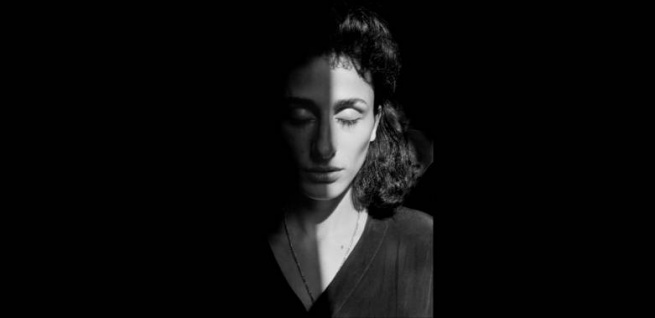
Letizia Battaglia, Rosaria Schifani, vedova dell’agente di scorta Vito, ucciso insieme al giudice Giovanni Falcone, Francesca Morvillo e tre suoi colleghi, Palermo 1993
In the catalogue of the exhibition organized at the Cultural Sites of Zisa in Palermo, there is a very good statement by Franco Zecchin describing your work. Photographing, he says, "meant involvement, osmosis, partisanship; energy exchange, feelings, attitudes, so overwhelming, full of humanity, understanding and respect". I wanted to ask you... it’s a lot of time since you quit working as a photographer for the newspaper "L’Ora"... what can you see now here in Palermo and how has it changed ?What do you portrait today?
The feeling is always the same, the one mentioned by Franco: respect, understanding, involvement. I’m a little bit old now and I can’t deal with the news section and tell about the city any longer. Physically I can not cope with it any more, but other things have been shaking me from inside, for example, rejecting these photographs. It started a few years ago,...twas a strong rejection, I could not carry such wounds any longer. The photographs are there, the memories are still there.
So I started to take other photos. Have you seen any "Reworking"? I thought about that and I still think about that, I’m thinking about burning the negatives again, it feel like a nightmare. I keep thinking about this at night. As the negatives are some sorta children to me, to whom am I supposed to give them to be taken care of? What is going to happen? It’s like leaving your kids. It’s ugly, there aren’t facilities able to host an archive, many photographers share this problem.
However, the city has changed, but I have changed, too. I’m disappointed, for things have not changed. Even if Palermo can count on a very good mayor and, I must say that, he has never allowed Mafia to sneak into the city hall. Anyway, there’s such a ferocity all around that the good things are not given any value, not in the newspapers, anywhere and everything is slowed down.
For example: I have been waiting for the "International Center of Photography", a wonderful pavilion I’m supposed to be given. Well, this thing in New York would take six months... a year in Milan....here...we’ve been going on like this for three years. I call, and then, the architect who made the project for free ( Iolanda Lima, a woman of my age) well, she also calls, but there are always obstacles slowing things down. Finally, I got to hold this great exhibition here in Palermo. There were tons of visitors, it looked like a procession!!! Man, it was almost twenty years since I had last held an exhibition in Palermo...
I meet people who thank me, "thank you" they say, there is a part of the town that is wonderful, but there is still this mafia blocking all the things you can do to grow a company, a people, because they do not care. It’s like Andreotti, ...he did not really care if they killed people here, he just wanted the votes for his political Party and here Mafia could guarantee them.
As a matter of fact at that time Andreaotti’s Sicilian spokesman , the MEP Salvo Lima, was killed ‘cause at some point Mafia wanted more, but they couldn’t get it for Mr. Orlando was the mayor and we were there as well, I was a councilor. We were innocent and defenseless, to tell the truth...
However, today this city has its charm I’m not going to leave; I could go if I really wanted... I could go live somewhere else, I actually keep on saying that, but I haven’t done it yet. It is kind of like a sorta magnet keeps me here. I organize lotsa exhibitions, I ‘ve got a pretty big cultural success. I have been to Rome to organize a great exhibition, much larger than this one here in Palermo.
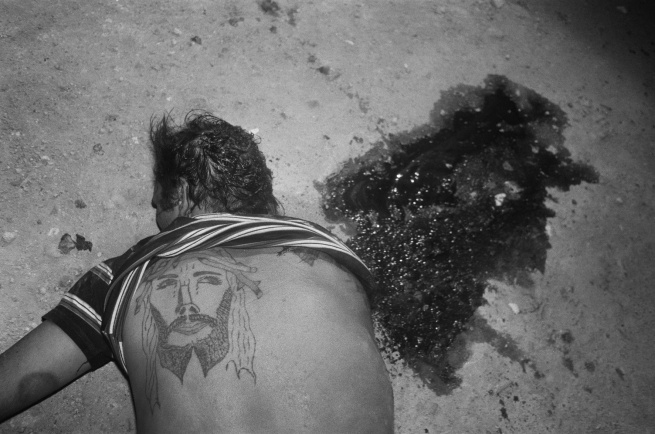
Letizia Battaglia, I due Cristi, Palermo 1982
When will it open?
On the 24th of November. There will be pages of the newspaper "L’Ora." They are working keeping the same set-up of the exhibition in Palermo: they will hung from above, all the walls of a huge space will be filled with small projects on my life. Many things: books I have produced as a publisher , newspapers ...
There’s one more thing I’d like to ask. Fred Ritchin gives photography credit for its ability to anticipate events, namely the ability to show the consequences of certain actions and making the people observing such images take part to the world changing around them. Your photographs are a proof and a teaching. Do you really believe photography can change the world? In your opinion what is the power a picture may have?
Photographs cannot change the world. My photographs, other people’s photographs...they won’t change the world, but just like a good book they might be a little flame. A book, a work of art, a Picasso, a photo, a music ....they can definitely be good to start a growth, but they can not change the world. The appetites of the war, of capitalism, of religions ...they are so strong, that photography and culture are just an aspect of the struggle, but they’re not enough to change the world. Nothing can change the world but your own conscience. And then you even try to speak to someone else’s conscience!!! Young people are very impressed with my work and this is beautiful. They kinda worship me. I know, I feel it, even if they haven’t even seen my pictures. I think it’s very important, it’s been very important to me...I mean, to have mentors... For example for my daughter Shobha, Osho was a real source of inspiration. She followed him and became a photographer like me, but following a different philosophy; I definitely belong to the Western culture, while Shobha favors the oriental one. You know, you do what you can do. But just like the "Divine Comedy" has not changed anything, how can you expect a small photographer from Palermo to change anything?
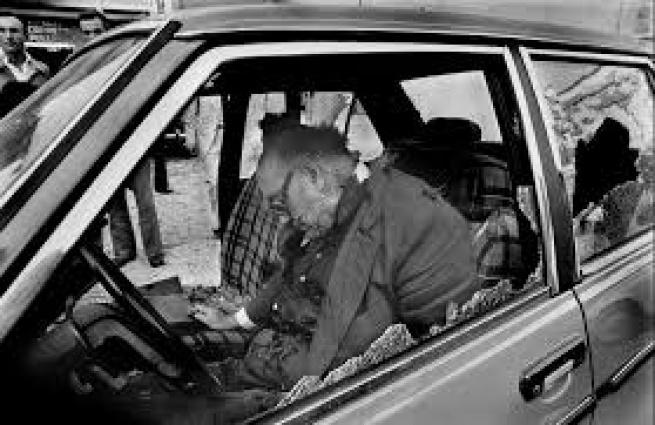
Letizia Battaglia, Il giudice Cesare Terranova, Deputato comunista, membro della Commissione Parlamentare Antimafia, Palermo 1979
You do convey enthusiasm, energy, optimism. I visited the cultural sites of Zisa. It is a huge place. On Sunday, May 8th your exhibition "Anthology" at the Zac space was closed. There were thousands of visitors admiring those great photos . I have read that the mayor Leoluca Orlando has symbolically given you the keys of the International Center of photography you have strongly wanted and that will be opened here in Palermo. What are your plans for this new space dedicated to photography and for your city?
Well, before getting too old , before losing this energy, this desire to make a change and to do many other things, I would like to set up this center, I would like this center could gather intelligence for photography, but also for music , for poetry, for visual art. I would like it to be open to young and old. I don’t like divisions in society. I love when the elderly, women, children and the youth stay together, because you can learn from everybody. I can learn from a twenty year old girl as well as a twenty year old girl can learn from me. So I would like it to be a place where you can grow, where you can enjoy great works of great photographers, both national and international.
I would like if up-and-coming photographers, those who have no space and no visibility, could have a place where they can exhibit their own works. The gallery is really wide and it will be divided into two galleries: one dedicated to great exhibitions , four or five, that are going to be held yearly; the other dedicated to the exhibitions of good photographers who want to be known. Quality is extremely important, as well as discipline while working, and last but not least the research while realizing a project. We do not want superficial pictures. No Facebook-style pictures. They have no photographic culture. Sometimes they might look nice, but they actually have no depth.
Then, at the bottom of this big space, there will be two large rooms: one will host the photographic archive of Palermo. I ‘m going to ask all the great photographers of the world who have been here to give one or two photos, or whatever they want to this poor city. Then I will ask the citizens, the families, old photographers to give some photos to rebuild the memory that has got lost, to make a super structure of Palermo through pictures. The pictures of the 1950’s were wonderful, hopefully I’ll get them...
The other project deals with organizing photography courses, which means culture courses, that is photography as part of a broader culture. A real photographer will never be able to own depth, nor talent, unless they go to the cinema, read books, listen to music ...They cannot make it through, however...The sole talent cannot last through the time.
So it’s going to be a living and lively center.
It is. The real matter is going to be about money, for there are no resources from the municipality.
Nothing at all?
Not at all, not from the municipality. I’ll do it for free . But I know the photographer Mary Ellen Mark is going to require an insurance and I think it will be about a few thousand euros -, so I will try to say: "Pay that, step by step". That is going to be a constant struggle. Then I’m going to ask my friends of the "International Center of Photography", let’s see if I can manage to find some resources. Slowly. It is a tough journey and I hope it won’t be destroyed by the next mayor.
[Letizia stops for a second. She looks straight at me and asks a question].
Can you see how things go in this world? If you don’t have anything sufficiently structured, you’re gonna lose it...they’ll steal it.
Then she tells me about something happened in the past.
You know, when I was a council member 20 years ago, I was in the park "La Favorita" and I happened to notice an old structure, probably dating back to the late 1800s, stables I guess . So I had the building restored and I made a "House-Nature" out of it, a place where we put all the typical countryside tools and where children could come and celebrate their birthdays, they could come by bike ... In conclusion, we did create a place where you could talk about nature, with initiatives about nature and living inside nature. It was a place for parties, you could do whatever you wanted. Then the city council has been brought down and I couldn’t help but witness things changing. It was a "House- Nature" no more. It’s become a place for municipal offices. A place completely surrounded by trees , because it is inside the Park. Such things may sound natural to you, but felt like real gifts to us. And it was over. All over.
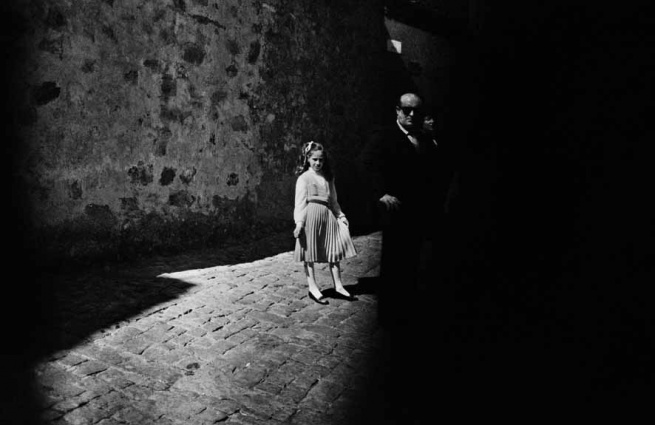
Letizia Battaglia, La bambina e il buio, 1980
She keeps on talking , without stopping, with enthusiasm and regret at the same time...
I planted a lot of trees when I was a councillor, just near the sea. I planted 70 palm trees at Porta Felice. After 20 years 25 of them had grown a lot. It was beautiful, like a palm grove in Tunis. My daughter Patrizia gave a pine as a gift, it became wonderful. One day I was having a walk in that area and I saw no palms. I was told they were sick and so someone had them cut. How irritating... And there is a cure for sick trees!!! It’s just 14 euros and you save the palm !!! They cut the pine as well, even though it was alright. They cut everything. Why? Well, that’s easy: a new project to fill this space. And when I planted the palm trees you could see only rubble there, just in front of the sea such as old trucks, animal carcasses, broken chairs, crap. Gardeners used to call it "The Oasis of Letizia". We first cleaned everything out, put some new earth, had water carried in tanks . It took us months, it was beautiful. And then... everything gone ... when I passed by you could still see some cut logs. They charge you 500 euros to cut a palm , everyone made a bomb in that deal. You get what I mean? I took pictures of those logs. They understood why I put them on the internet and now they are doing some stuff I don’t really want to know about...
[I cannot ask further questions for Letizia Battaglia keeps on talking. I don’t stop her, as I silently listen to her story. Photography and life are so entwined, and every single detail seems to be essential to understand her images].
How can you cut palm trees? Just think that even University was given a lot of money to study the red weevil. They took the money ... A professor from Barcelona experimented a new treatment on palm trees for just 14 euros. He was called to various cities of Italy and he saved lotsa palms. You know, in Palermo there is a beautiful villa in Via Dante, with beautiful palms and green trees. It eventually turned out that it was run by a ..."goodfella". You know, that man treated the palm trees using that method. And palm trees are still there. There was the business. They had to do business also on poor palms. You see? But let me go back to what we were talking about. I’m afraid that once you carry on such a wonderful project giving honor to photography and to all of us, suddenly someone decides to shut it down and say, "what do you mean, a photography center ????"
[She stops again. She looks at us and asks]:
Are you going to follow this matter? Are you going to get info?
Of course we are.
Ok. Are we finished? You have so many fucking questions to ask in one hour!
Good one! I ‘ll be quick. There is a photograph that really got me. It was taken by Franco Zecchin in 1976 and you were just on the site of a murder. You are dressed in black and you are crouched down.
Yeah, I was sitting on my pictures bag.

Franco Zecchin, Letizia Battaglia sul luogo di un omicidio, Palermo, 1976
Your were holding the camera in your hand while looking at a lifeless man on the street. What’s in your eyes?
Perhaps mercy. Fear,dismay... I remember getting there every time and I knew someone was dead, but I’d say, "Christ... I saw a movement, this guy is hurt, this guy is not dead!". We had this thought for many others, for Mattarella who was the president of Sicily, and for some judges. And that’s it... But what was it? Sucking your soul in front of a dead man, who did not die naturally. I am a pacifist, I go crazy when I think of wars, all wars. You’ve heard of the Ghanaian boy killed in Fermo, haven’t you?
Yes, I have....
It’s a terrible thing, he was a Catholic, and that one killed him! I haven’t figured out how yet. A fight? How? He was also married, he had survived one of those horrible trips across the sea ... And we, we, we killed him. Since the soccer fan is our son ... let’s go ahead.
In 2012 I saw your exhibition in Brescia at the Massimo Minini gallery. I saw a series of images called "Reworkings". You choose among your painful images of death and tragedy, you have them printed in a large format, so those presences become almost life-size , and then you place something recalling life just in front of the corpses : a woman’s body, a little girl , a flower. What do these images mean to you? A desire of oblivion, of life, of peace, of rebirth?
No oblivion. As a matter of fact the dead man is still there. Everything derives from the fact that I could not stand being so passive in front of those photographs. I was holding exhibitions, but I was passive. So I thought that adding pictures of the living, of young children, of women to the pictures of the dead could be a sorta way to invent another reality, to move the famous punctum from the murdered. A naked woman’s life, a mother, the Earth. So that’s what I do: I build a new reality, I add a picture of life to an image of death . A successful project? A failure? Well, at least I tried...
One of those "Reworkings" is hanging on the wall and she points at that.
This is one of those I ‘ve made. I called it "Jasmine." Only jasmine. It was made on my terrace.
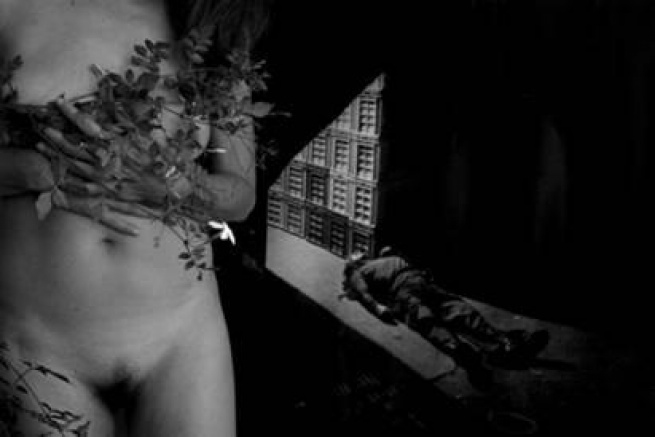
Letizia Battaglia, Rielaborazione. Il gelsomino, 2004
I would like to ask you about your relationship with the women you photograph. In your photographs there are many faces of women and especially girls, for example the picture "The child and the darkness, Baucina, 1980", or your reworking entitled "Three Women": on the background you can see Rosaria Schifani, the widow of the policeman Vito Schifani, killed in the Capaci massacre; and the bust Eleanor of Aragon by Francesco Laurana and Marta, his niece. What message are you going to communicate through the body and the face of women?
Not really a message, but rather a necessity. I do not think of the message , of what I convey....I mean, maybe later. It is more about building a different world, reinventing a new world; hoping is necessary , desperately. Marta is young, Rosaria has suffered a lot, Eleonor of Aragon is a symbol of pride in the art. I wanted to rebuild the world through women. I believe in women. I do believe! We have joined institutions, judiciary, politics, but we haven’t reached the 50% yet. Here politics is still a men’s prerogative, everything seems to be a men’s prerogative...it’s a male-chauvinistic society.
So I don’t realy think that once we get to govern we’ll organize all these wars. It is not possible. I want to believe we will never do it. We won’t send our children to death, to be killed, even if certain episodes about Camorra and Mafia let us know that there are terrible women, who believe in violence. But I’m not stupid, I actually have no illusions. I’d like , somehow, to rebuild this world. Words are usefull, books are usefull, esseys are usefull , movies are usefull. Everything can help! Photography also can help, too! And this is what I have. A camera. To take photos. As for girls ...that is another matter. Girls have to do with me. When I was ten I was happy, I was free. I would have so many dreams: I would dream about becoming a writer, about having my own Prince Charming. I spent part of my childhood in Trieste. Then , after the war, we came back to Palermo. It took us fourteen days to get back here, I remember feeling like on a livestock van as carrying all that stuff, our stuff... We arrived in Palermo and we started living at my grandmother’s. I remember living happily but one day, as I was hanging around, I met this gentleman who opened his coat and showed me his treasure. I immediately ran home and told my parents. And that’s when I lost my freedom. Goodbye freedom.
They got frightened. They said those villains are everywhere. Yes, ok. True. But unfortunatley that happened in Palermo, so my dream ended up being me running away from my father ‘s home and starting my own family. That’s why when this young guy who would claim to love me so much, I was fifteen , I said yes. I got married, I wanted many children, I wanted to be happy. But things went in a slightly different way. When I think about my life now, I’m sure I haven’t spoilt it , I’m honestly happy with how things have gone, I’m still free, I say what I think and I’m not afraid to say it. This makes my life not miserable .
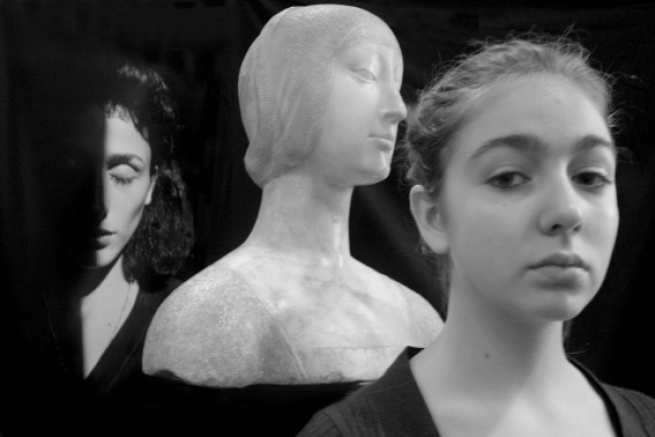
Letizia Battaglia, Rielaborazione. Rosaria, Eleonora d’Aragona, Marta, 2010
She looks at us with love.
You’re young. Who’s the youngest? How old are you? I started to be a photographer when I was 40. That’s interesting , because it is believed that women’s path, when they are 40, has already been determined. This is important for all those women who think that beauty and youth are the only things that matter. Wrong. Even now that I’m old I believe that you can always get so much love, and attention.
There is an image I would like to ask you about. "Mysteries. The dove "(Trapani, 1989). What lies behind the flight of the dove? Is it about lightness, about whiteness? Is it your vision?
It’s about beauty. The beauty of what may happen. How is it possible for the child and the dove to look at each other? The dove means that life is really beautiful. I do not know if it’s about candor. I do not think so. The dove is a symbol of life to me, it is an anymal flying in the sky. This is what it is: life is beautiful and demanding as well. All right? But I reckon you want to know more.
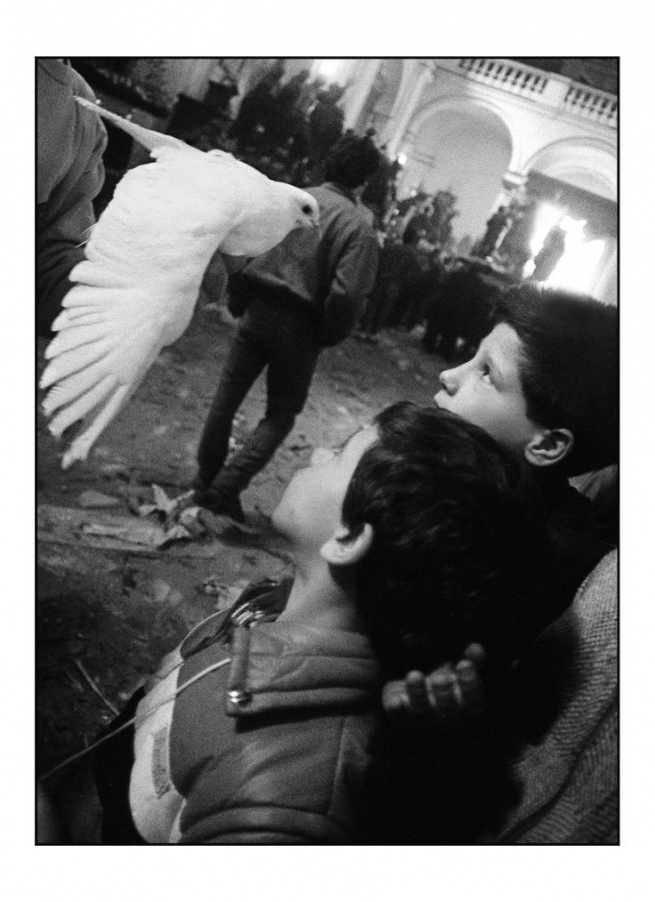
Letizia Battaglia, I misteri. La colombina, Trapani 1989
Yes indeed. I ‘d like to know about your numerous activities. In 1977 you and Franco Zecchin opened the If Laboratory, a gallery including a small library; in 1980 you and other people founded the Sicilian Documentation Centre which was eventually dedicated to Peppino Impastato; then the experience for the newspaper "Grandevù. Greatness and meanness of Palermo "; the publishing company" La Luna " that you founded with other women to promote women’s literature"; and again at the end of 1991 your started "Mezzocielo" , at first a monthly magazine and then bimonthly ; and again in 1992 you founded "Battaglia’s Editions", a publishing company financed using your regional member salary. You have worked with many women and promoted their work...what has this represented for you?
I still work for "Mezzocielo". I’ll give you a copy later. I have always thought that women do not have their proper light in society, not yet. That’s why I always privilege women, also in my pictures. The positive side of my photographs, the ones I choose, is based on women. Working with women is complicated because they are a bit scarred ... Men have made them a little wary and jealous ... So that’s the way they are now... But I feel you can work with them, they are more committed, they are not sloppy. At least some of them, I have not worked with all of them. Anyway, if I have to be sympathetic with someone, I choose to be with a woman.
She tells me something else about her life.
When I was a councilor, a man came to me . "I do not know what to do," he told me,"I should buy an Apecar, but I have no money, may you please check if the municipality can help somehow?". I said "No, the municipality has no money. But let’s see. How much does it cost?". “5000 euros” he answered. So I go: “Come here with your wife and let’s talk about that”. So here he comes with his wife, but she was silent all the time, for he was always speaking. And I go: “Look, I’ll give you the money, but a half is for you and a half for her. This Apecar will belong to you both”. And even if I am an atheist, we met a priest I really trusted, he just lives nearby and before him we signed that agreement. So I donated five thousand Euros and they bought the Apecar.
I’m telling you this so you can get the point, and the point is that I did want that man to understand that if his wife hadn’t been there, I would have never given him the money. So she had her hand. Then I have no clue how it finally ended up, I haven’t seen them anymore. You know, I think women need helping, they need supporting . Nowadays girls can manage their own freedom , they like dressing all bare-necked; yet they need help. They need help because they are not structured. Today’s society and their families,... they don’t provide them with the proper structure to grow as people able to live happily in the world and ruling the world... But I don’t mean "ruling" as dominating other people, but rather ruling themselves, as a part of this wonderful centuries-old project . And I’m glad you are women, I like it better.
Thank you!
I have always had boyfriends , but I’d rather take pictures of women: naked , dressed,.... they are more poetic. A naked man is not interesting to me, I don’t care about muscles, but lightness. Ok, good, that’s all folks. I told you everything I like. This number of "Mezzocielo" I’m going to give you is just about falling in love. I wanted to do that. Where does falling in love end up and why? Even a psychoanalyst couldn’t answer such questions. You will do crazy things for someone you like and then you tell yourself: "so...well?", you feel ridiculous. Why? Is it just a chemical thing? We don’t know. Ok, goodbye now, here’s the magazine. You can leave.
The interview came to its end, but we eventually kept talking about us. We agreed on meeting again in Rome, to see her exhibition. Then we hugged on the threshold, as if we had known ever since.
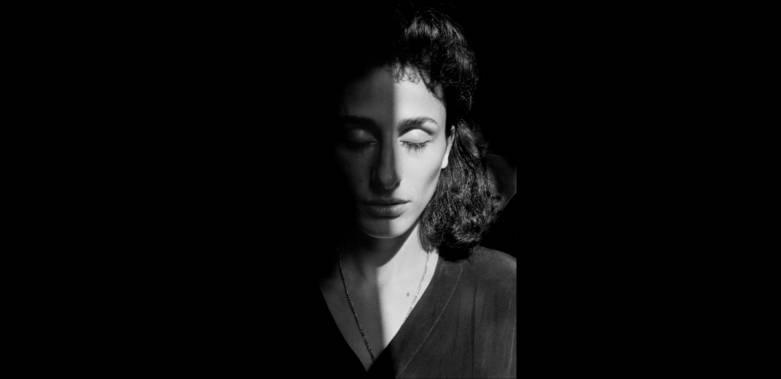









 Since 2011
Since 2011 

